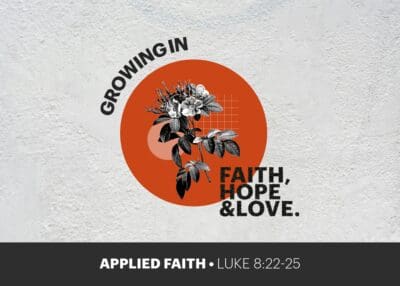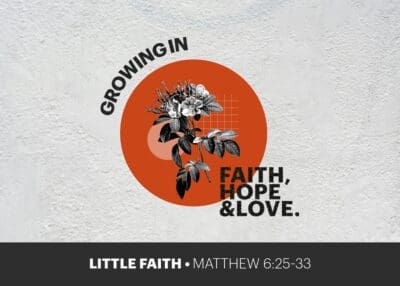Please open your Bible at Hebrews 11 as we continue our series, Living by Faith.
We’re learning from this chapter what a life of faith looks like. We’ve seen that faith: Listens to God, Walks with God, Fears God, Obeys God, Receives from God, and Submits to God.
Today we come to a seventh feature of faith: Faith Worships God. And we see this in the story of Jacob. “By faith Jacob, when dying, blessed each of the sons of Joseph, bowing in worship over the head of his staff.” (Heb 11:21).
The key word here is worship. Jacob ended his days in worship, leaning over his staff. It’s a beautiful picture. Here is a man so unsteady on his feet that he needs a stick to hold him up. He can’t raise his hands in worship. If he did, he would fall over, but holding onto his stick with both hands, he bows his head in worship before God.
This scene is certainly not the first scene that comes to mind when you think of Jacob. There are other stories from Jacob’s life that seem more likely to be remembered. By faith Jacob wrestled with God. He said “I will not let you go unless you bless me” (Gen 32:26).
But that amazing story gets passed over, and what is recorded here is the relatively obscure occasion at the end of Jacob’s life when he blessed the sons of Joseph and worshipped, leaning on his staff.
What makes this even more surprising is that this is not a story about the continuation of the line into which our Lord Jesus Christ would be born. We saw last week that when Isaac blessed Jacob, he was naming the heir to the promise. He was announcing the line into which the promised Savior would be born.
This is not the case here. Hebrews tells us about Jacob blessing the sons of Joseph. And Jesus was not born into the line of Joseph. Jesus was born into the tribe of Judah. So, this story is not about identifying the line into which the Savior would be born. The focus here is on an old man who worshipped and Hebrews tells us that he worshipped by faith.
Worship is one of the fruits of faith. Where there is faith, there will be worship.
Let me remind you of the story of Jacob. When Jacob fled from home in fear of what Esau might do to him, he went to work for a man called Laban, who had two daughters. Jacob fell in love with one of them, whose name was Rachel, and he served Laban for seven years to win her hand in marriage.
But when the day of the wedding came, Laban played a cruel trick on Jacob. The bride behind the veil was not Rachel, but her sister Leah. Jacob had been deceived in a way that was a mirror image of how he had deceived his father. God taught Jacob to hate his sin by allowing him to feel its painful effects in his own life.
The Bible makes it clear that God often deals with us in a way that reflects the way we deal with others.
“With the merciful you show yourself merciful; with the blameless man you show yourself blameless; with the purified you show yourself pure; and with the crooked you make yourself seem tortuous” (Psa 18:25, 26).
You see this very clearly in the life of Jacob. The deceiver was deceived. Jacob got a taste of his own medicine. And that is how he came to hate his own sin.
You see this same principle in the teaching of Jesus: “With the judgment you pronounce you will be judged, and with the measure you use it will be measured to you” (Matt 7:2). “So whatever you wish that others would do to you, do also to them, for this is the Law and the Prophets” (Matt 7:12).
God brought Jacob to repentance by repaying him in his own coin. What Jacob did to Isaac, Laban did to him. His own sin rebounded on him until he hated deception as much as he used to love it.
Jacob worked for Laban another seven years and then Laban gave him the hand of Rachel in marriage.
Needless to say, this was not a happy family. Leah was blessed with children one after another: Reuben, Simeon, Levi, Judah, Issachar, Zebulun.
Then, finally, Rachel conceived, and gave birth to Joseph. Jacob had a special love for Joseph because he was Rachel’s firstborn. And Jacob showed this love by giving Joseph a coat of many colors.
It’s not surprising that the brothers resented Joseph. And their resentment became worse when he told them about his dream that one day they would all bow down to him. This was what God had revealed, but the brothers didn’t like it. And from that day on, Joseph’s brothers hated him.
One day, Jacob sent Joseph to visit his brothers who were pasturing their sheep. The brothers were determined to get rid of him, so they sold him to traders, who took him to Egypt.
But the brothers kept Joseph’s coat. They dipped it in the blood of an animal, and then they brought it to Jacob and said, “This we have found; please identify whether it is your son’s robe or not” (Gen 37:32).
Jacob had been deceived by Laban. Now he was deceived by his own sons, and this was the most painful deception of his life.
Jacob looked at the coat, covered in blood, and he said, “It is my son’s robe. A fierce animal has devoured him. Joseph is without doubt torn to pieces.” (Gen 37:33). Then Jacob tore his clothes. He covered himself in sackcloth and he mourned.
This went on for days. The brothers began to think it would never end. And the Scripture says, “All his sons and all his daughters rose up to comfort him, but he refused to be comforted and said, ‘No, I shall go down to Sheol to my son, mourning’” (Gen 37:35).
I’m going to go to the grave in misery. I’m going to live the rest of my life in mourning. There’s not joy for me now. No future for me. Nothing for me to look forward to. Jacob was devastated. Losing Joseph, he felt he had nothing left to live for.
Meanwhile, Joseph was very much alive in Egypt. God blessed him, and he rose to become the most powerful person in the land, second only to Pharaoh.
Some years later, there was a widespread and devastating famine. God had revealed that famine would come in a dream given to Pharaoh. After Joseph interpreted the dream, Pharaoh put him in charge of preparing for the famine by storing up grain in years of plenty so that there would be enough to feed the people in the years of famine.
So, when there was no food in Canaan, Jacob sent his sons to Egypt. They had no idea that the man in charge of the storehouses was the brother they had sold as a slave and when Joseph revealed himself, they were terrified. But Joseph forgave them for what they had done and told them to bring their father Jacob to Egypt so that Joseph could see him again.
The brothers returned to Jacob and told their father that Joseph was alive in Egypt, and that God has raised him to a position of power and authority in the land. Can you imagine, after years of inconsolable sorrow over the loss of his dearly loved son, Jacob now hears that his son is alive.
Scripture records that when the brothers told the truth to Jacob, “his heart became numb, for he did not believe them” (Gen 45:26).
How could this possibly be? Joseph had been torn to pieces by a wild animal. Jacob had seen the blood on the coat. So now the brothers had to confess that they had deceived their father. And Jacob realized that he had lived in misery for years because he had believed a lie.
Joseph sent wagons to carry his father to Egypt and Jacob said, “Joseph my son is still alive. I will go and see him before I die” (Gen 45:28). There is great sadness in these words. “Joseph is alive, but its too late for me now. My life is over and nothing can bring back the years I have lost. I will go and see Joseph, but after that I am done.
The reunion was hardly the celebration that you might expect. When Joseph came to meet his father in Egypt, we read that “He presented himself to him and fell on his neck and wept on his neck a good while.
Israel said to Joseph, “Now let me die, since I have seen your face and know that you are still alive” (Gen 46:29-30).
Really Dad? Is that all you have to say? What about, “Son it is so good to be with you at last!” “Son, let’s treasure every day that we have together.” No! Nothing like that. Just a rather miserable old man who says, “now let me die!”
But God had something better in store for Jacob than dying on arrival. “Jacob lived in the land of Egypt seventeen years” (Gen 47:28). And these years brought a remarkable change in Jacob.
We know this because Jacob gave two descriptions of his life. One when he arrived in Egypt. The other, 17 years later, when he worshipped leaning on his staff.
When Jacob arrived in Egypt, he said to Pharaoh, “The days of the years of my sojourning are 130 years.
Few and evil have been the days of the years of my life, And they have not attained to the days of the years of the life of my fathers in the days of their sojourning” (Gen 47:9).
When Jacob arrived in Egypt, he was full of regret. Pharaoh asks, “How old are you?” “130 years, but that’s not much! Compared with my father and grandfather, my years are few. I don’t amount to much beside them.” And if I was to pick one word to describe my years, the word would be “evil.”
Looking back I wish I had chosen a different path. I wish I had done more with my life. It all seems to have passed so quickly. Pharaoh, you ask me about my years. I’d say they were “few” and “evil.”
There’s not a lot of faith there. There certainly isn’t any worship. But that’s not the end of Jacob’s story. And if you find yourself today in a place of regret, it need not be the end of your story either.
Jacob changed during his years in Egypt. The faith that seems almost to have died in him, revived. And when faith revived, Hebrews tells us that Jacob worshipped. Where there is faith, there will be worship.
God gave Jacob seventeen years in Egypt, and at the end of that time, Jacob gave a very different account of his life “The God before whom my fathers Abraham and Isaac walked, the God who has been my shepherd all my life long to this day, the angel who has redeemed me from all evil, bless the boys; and in them let my name be carried on…” (Gen 48:15-16).
Jacob arrived in Egypt full of regret: My years have been few and evil. But seventeen years later, he looks back on the same life and says, “I now see that God has been my shepherd all my life long. He has redeemed me from all evil. Evil has not had the last word in my life. And he worships.
If your faith is burning low, this is a story for you. If you live with a lot of regret, or if you look back on your life and say, “it has all gone so quickly and I wish I had made different choices,” this story is for you.
Jacob made a journey from regret to worship. And you can make Jacob’s journey too. The way that Jacob did it and the way that you can do it is by faith. Where there is faith, instead of regret, there’s going to be worship.
How did Jacob move from regret to worship? How did faith take Jacob to an altogether different view of his entire life?
Two things I want you to see from this story today:
1. Faith Worships Because It Receives God’s Forgiveness
“By faith Jacob, when dying, blessed each of the sons of Joseph, bowing in worship over the head of his staff” (Heb 11:21).
I love this picture of Jacob leaning on his staff. A man remembering, looking back, reflecting. His mind wandering through the various scenes of his extraordinary life.
When Jacob looked back on his life, he would remember how he had deceived his father. He would remember how he had been deceived by Laban and by his own sons. How could he ever forget these things? His entire life had been shaped by the mirror image of his own sin.
Old sins have a way of catching up with you, especially in later years. You are leaning on your stick, or sitting in your chair, or lying in your bed, and you say, “Why did I do that? What a fool I was. What was I thinking about?”
But Hebrews tells us that at the end of his life, Jacob worshipped! There’s only one way that a man whose life has been filled with regret can worship, and that is that he knows he really is forgiven.
Jacob bows his head in worship because he knows that God does not hold his sins against him. God has forgiven him. God has cleansed him, God has restored him. And looking back, he sees that through all the painful years of his life, he sees that through it all, God’s love has never let him go.
Jacob’s journey from regret to worship can also be yours. Listen to this promise of God, and to its condition: “If we confess our sins, he is faithful and just to forgive us our sins and to cleanse us from all unrighteousness” (1 Jn 1:9).
Notice there’s something for us to do, If we confess our sins…It is not enough to say, “God forgives, so all is well.” We must confess. We must draw near to God in repentance.
The freedom of knowing that we are forgiven comes when we repent. Guilt is lifted and cleansing comes when we draw near to God in repentance and confess. Without that, we live in regret. And nothing inhibits worship more than a conscience that has not yet been cleansed.
Perhaps you know what this is like. You come to worship and you think about your own sins. You look back on what you have done. You think about what might have been and you feel miserable.
Robert Bruce says, “When there is no repentance, our sins are remembered.” [1] That’s how it was for Reuben, Jacob’s oldest son. He had committed a particularly vile sin. And at the end of Jacob’s life, it was still remembered. “Reuben, you are my firstborn…Unstable as water, you shall not have preeminence, because you went up to your father’s bed; then you defiled it…” (Gen 49:3-4).
That was years ago. Why would Jacob bring it up at the end of his life? Jacob was speaking as a prophet.
The Spirit of God brought this to Jacob’s mind. God was saying, “Reuben, your sin is still before the Lord: You need to repent!”
Brothers, sisters, we cannot be cleansed from guilt and shame simply by moving on. “If we confess our sins…” That means there’s something there for us to do.
So, don’t wallow in misery when you come to worship. Do what God calls you to do! Draw near to him. Confess. Repent. Do what needs to be done with regard to others when confession to others needs to be made.
But now listen to this marvelous promise: “If we confess our sins, he is faithful and just to forgive us our sins and to cleanse us from all unrighteousness” (1 Jn 1:9).
This promise is so good, it is hard to take in. That’s where faith comes in. Faith believes what God has revealed, and trusts what God has promised.
And Jacob was able to worship at the end of his life because faith receives God’s forgiveness.
Forgiveness can be yours by faith in the Lord Jesus Christ. And when by faith you know that you are forgiven, you will worship!
2. Faith Worships Because It Believes God’s Promise
“By faith Jacob, when dying, blessed each of the sons of Joseph, bowing in worship over the head of his staff” (Heb 11:21).
Joseph’s sons were crown princes in Egypt! They had it made! Jacob had arrived in Egypt as a refugee. He didn’t own anything. So how could Jacob bless these boys?
Jacob had something more valuable than all the treasures of Egypt. He had the promise of God. The promise of life in a land that God would give. When Joseph heard that his father was ill, he took his two sons, Ephraim and Manasseh, to see the old man before he died (Gen 48:1ff).
Jacob said to Joseph, “And now your two sons, who were born to you in the land of Egypt before I came to you in Egypt, are mine; Ephraim and Manasseh shall be mine, as Reuben and Simeon are” (Gen 48:5).
Jacob adopted the sons of Joseph as his own. And that meant that Ephraim and Manasseh became the heads of tribes that were named after them.
Each of Jacob’s sons became the head of a tribe. The sons of Reuben were Reubenites. The sons of Simeon were Simeonites. The sons of Levi were Levites. But the sons of Joseph were not Josephites. Ephraim and Manasseh became the heads of their own tribes as if they were both Jacob’s sons, with a direct share in the promise of God.
Generations later, when God’s people entered the Promised Land, it was divided into twelve regions, one for each of the twelve tribes. And if you look at a map of how the land was divided, there are two surprises:
- No land was given to the sons of Levi. This was because the special calling of the Levites was to serve the other tribes by leading God’s people in worship, and they were supported in this works by the other tribes.
- Joseph, the firstborn of Rachel received a double portion. Jacob said to Joseph, “Ephraim and Manasseh are mine.” So instead of giving one portion of land to all the descendants of Joseph, land was given to the children of Ephraim and land was given to the children of Manasseh, as if they were Jacob’s own sons.
When Jacob adopted Joseph’s sons, he made them direct sharers in the promise of God. “Boys, you have been born to great wealth. But hear this from an old and dying man. You may have full and rich lives here in Egypt, but this is not where you belong. You belong to another land. A land you have never seen.
You will prosper in Egypt, but here’s what really matters. You belong to the people of God. You are heirs of God’s promise. Your destiny is in another land.”
Jacob gave these boys a direct share in the promise of God. And that is exactly what God has done for us in Jesus Christ. This mystery is that the Gentiles are fellow heirs, members of the same body, [one body together with the 12 tribes of Jacob] and partakers of the promise in Christ Jesus through the gospel.
We live our lives in this world, as Ephraim and Manasseh lived their lives in Egypt, but God has given us through Jesus Christ “an inheritance that can never spoil or fade, kept in heaven for you” (1 Pet 1:4). And faith worships because it believes God’s promise.
Jacob arrived in Egypt full of regret. He ended his days in worship, leaning on his staff. That journey from regret to worship is one that you can make too.
Jesus said that the Father is seeking people who will worship Him in spirit and in truth. And you can become such a worshipper by faith: Faith receives God’s forgiveness. Faith believes God’s promise. And where there is faith, there will be worship.
Prayer
Our Father in heaven, make us the worshippers that You are seeking because by faith, we receive Your forgiveness and believe Your promise through Jesus Christ our Lord, Amen.
—
[1] Robert Bruce, Preaching Without Fear or Favor, p. 315
[elementor-template id=”128476″]






